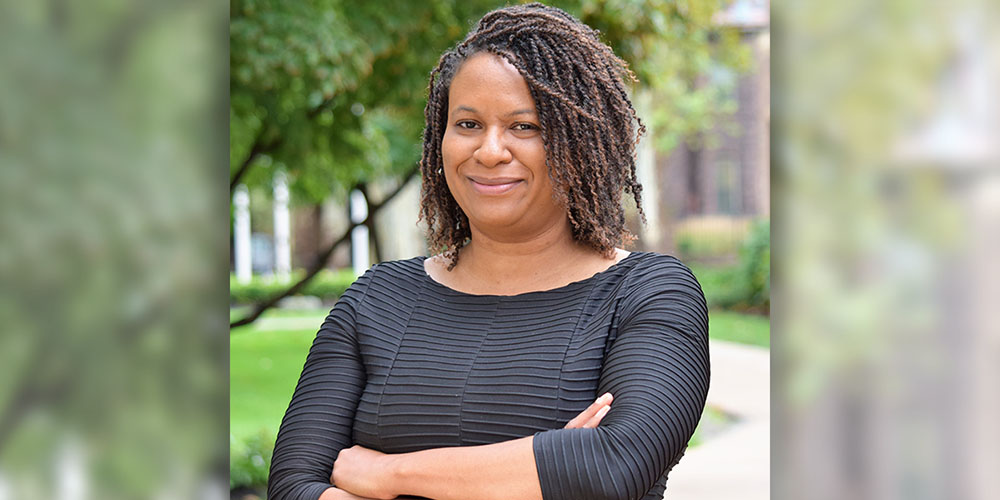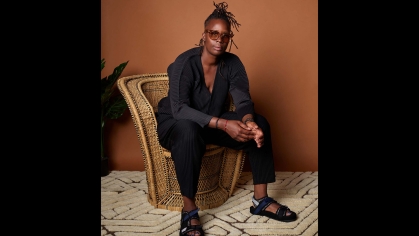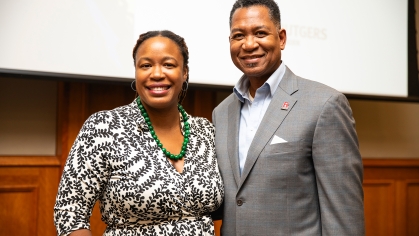Rutgers–Camden Names Besong Vice Chancellor of Student Academic Success
Appointment reinforces university’s student-centered commitment.

Rutgers University–Camden bolsters its commitment to an innovative, student-centered approach to academic achievement with the appointment of Marsha Besong as vice chancellor of student academic success.
“I hope to build upon the culture of student-centeredness that already exists at Rutgers–Camden,” said Besong, who previously served here as assistant chancellor for student success for five years. “I hope to be able to create a common language around student achievement. That means meeting students where they are, encouraging them to do their best and challenging them to succeed in their respective goals.”
Rutgers–Camden Chancellor Antonio D. Tillis noted the exceptional job that Besong has done during her seven-year Rutgers–Camden tenure. He now looks forward to working with her to continue meeting the needs of the university’s diverse student population. “Rutgers–Camden students have their own unique goals and expectations, but with leaders such as Marsha Besong guiding our focus, we are able to assist students no matter what their challenges might be,” said Chancellor Tillis.
Besong recalled that during her time at Rutgers–Camden — beginning as Educational Opportunity Fund (EOF) director for two years — she has seen tremendous student growth on campus, especially among students of color and other minorities. As Rutgers–Camden has flourished in its mission of access and affordability, she said, her work has consistently focused on helping students to reach their academic and career goals. She believes that her new role allows her to further that work on a wider scale. “This will allow me to impact more students and begin new initiatives to further Rutgers–Camden’s mission of student success,” she said.
The COVID-19 pandemic has changed what a typical day looks like on the Rutgers–Camden campus, Besong noted, but never the process of helping students to navigate campus structures and resolve any academic issues they may experience. She also spends considerable time working with deans and faculty in the various academic units to help plan student interventions. “We are working together to ensure students’ academic success in the classroom and co-curricular space,” said Besong.
She also works on a variety of student-support projects, including those affiliated with Rutgers–Camden’s designation as a Minority Serving Institution (MSI) by the Department of Education under Titles III and V of the Higher Education Act. In addition, her office oversees EOF, the Rutgers–Camden Learning Center, TRiO Student Support Services and the Student Success Coach Office. “We offer services that encompass the entire Rutgers–Camden student population, ensuring that all students have the full resources that they need to be successful and feel a part of the Rutgers–Camden community,” she said.
Besong began serving in her role in an acting capacity in June 2021 and hit the ground running. She helped to implement several innovative initiatives, including Alpha Alpha Alpha, an honor society for first-generation students that began with 85 students the first year and will induct another 80 students in March. Besong also helped to form Bridging First Generation Students (B1GS), a student organization for first-generation undergraduates.
Prior to Rutgers–Camden, Besong worked in a variety of positions in the nonprofit and education sectors. Her experience includes directing a holistic educational and support services community center for preschool students through adults for Philadelphia’s Beacon School Project, managing student success initiatives and student affairs at Harcum College and overseeing strategic planning and school reform efforts for two elementary schools at Drexel University. She also implemented a Department of Labor grant at the School District of Philadelphia to increase student achievement and career readiness at 10 comprehensive high schools with extensive histories of violence.


